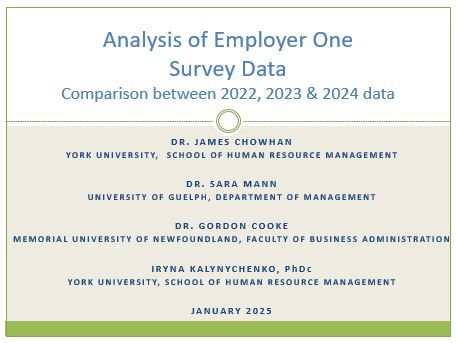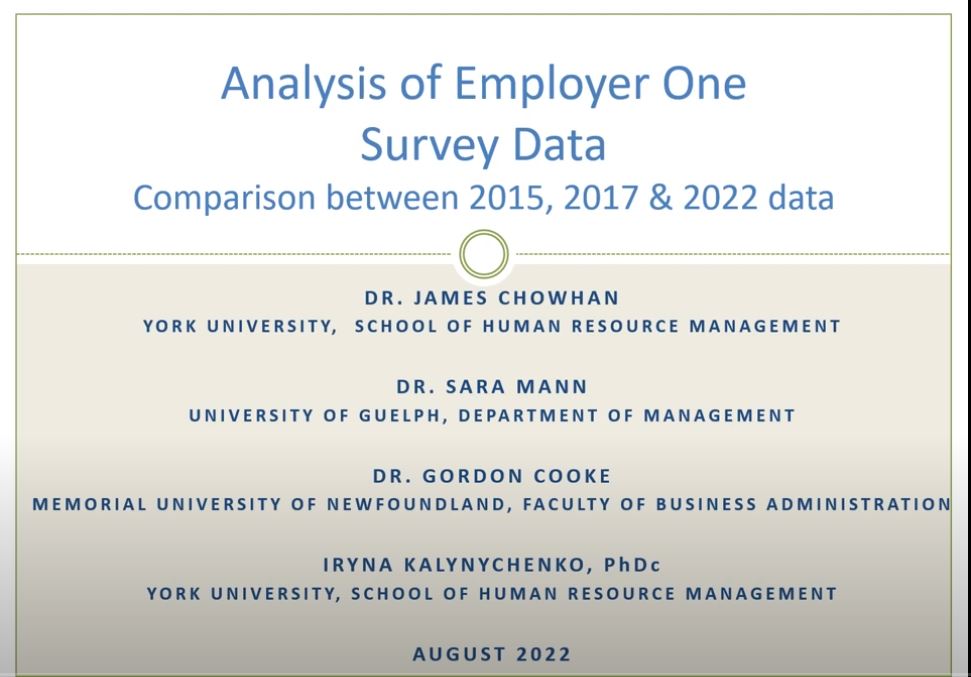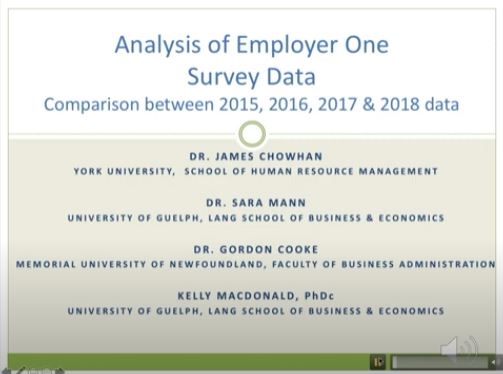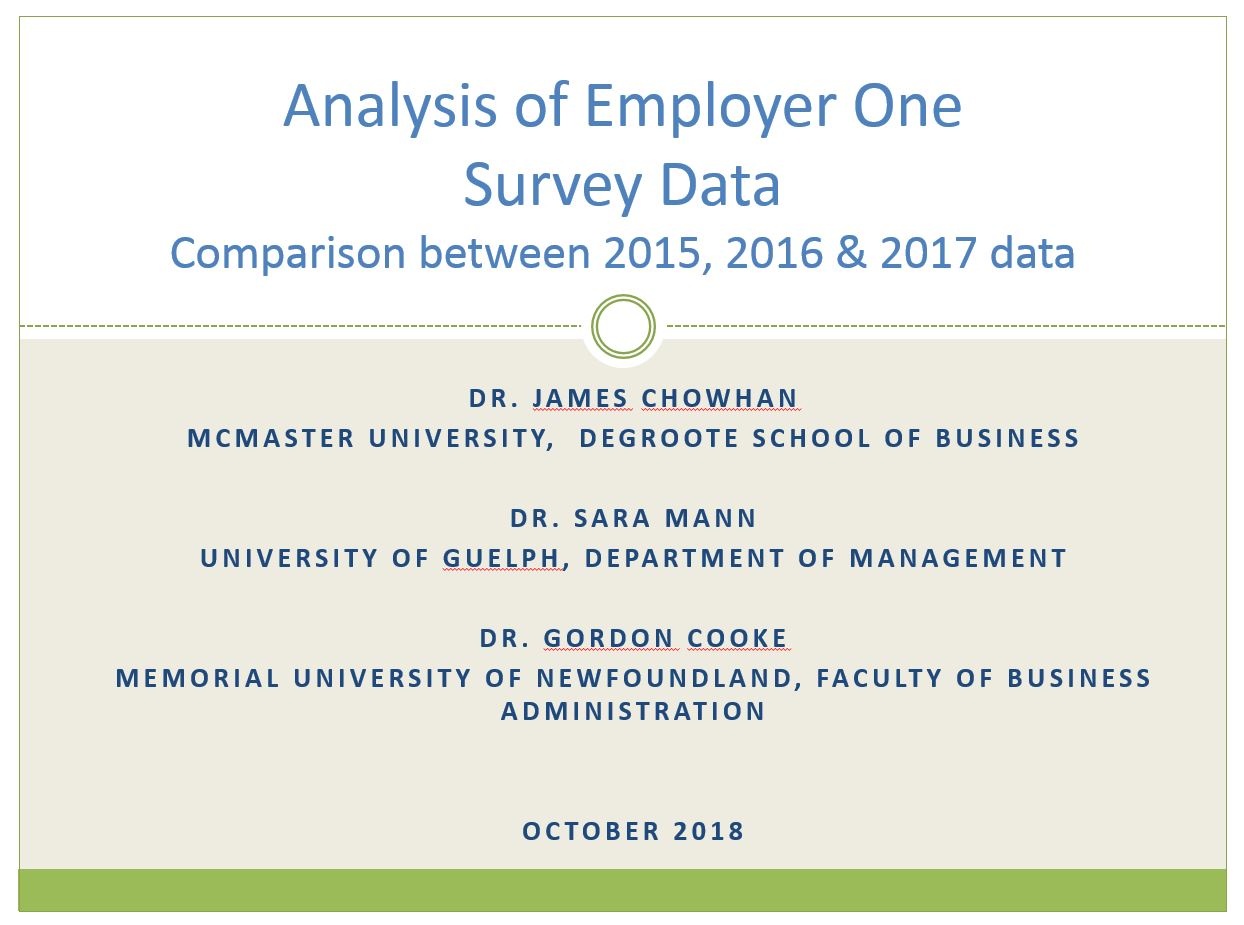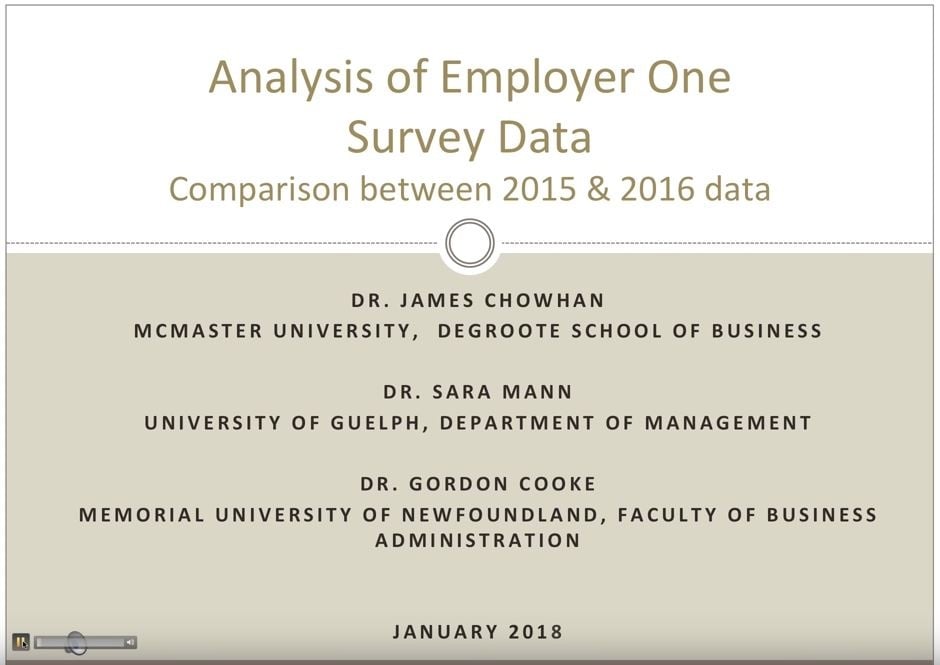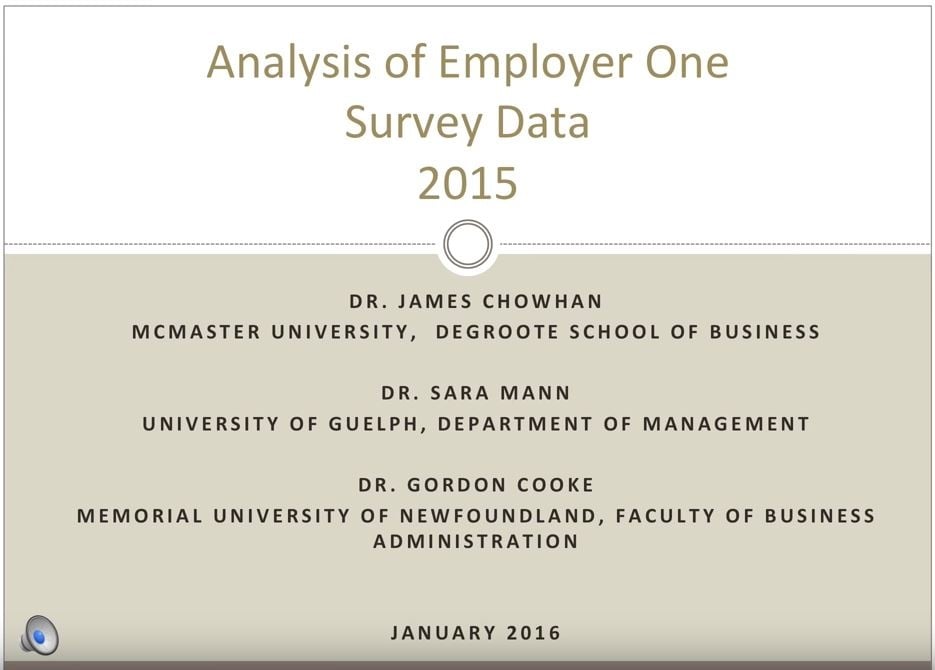Employer One
Collaboration with Ontario Workforce Planning Boards
| |


This EmployerOne project is a collaboration with Dr. Sara Mann from the Department of Management at the University of Guelph, Dr. Gordon Cooke at Memorial University, Dr. James Chowhan at York University, and the  Workforce Planning Boards (WFPB), 2014 to Present. We partnered with the WFPBs and provided an aggregate analysis Employer One Survey Data. The WFPBs collected the survey data, and our research team completed the annual comparison analysis of these data. Two main outputs are available below: pdf reports and video presentations. These outcomes make comparisons across communities, industries and periods of time for the years 2015, 2016, 2017, 2018, 2022, 2023 and 2024. We are extremely excited about our involvement in this project and about the opportunity of future analysis. Our findings offer valuable insights into evolving trends and can guide informed decision-making processes.
Workforce Planning Boards (WFPB), 2014 to Present. We partnered with the WFPBs and provided an aggregate analysis Employer One Survey Data. The WFPBs collected the survey data, and our research team completed the annual comparison analysis of these data. Two main outputs are available below: pdf reports and video presentations. These outcomes make comparisons across communities, industries and periods of time for the years 2015, 2016, 2017, 2018, 2022, 2023 and 2024. We are extremely excited about our involvement in this project and about the opportunity of future analysis. Our findings offer valuable insights into evolving trends and can guide informed decision-making processes.
History of our Partnership

The Western Workforce Planning Boards (WFPBs) developed and administered the EmployerOne survey to gain a deeper understanding of the workforce issues and challenges within their region, including projected vacancies, hiring intentions, recruitment strategies, and candidate skills, education, and training perspectives.
In 2014, our research team presented our work at a Rural Research event hosted by OMAFRA, which led to a conversation with a representative from the Sarnia Lambton WFPB about a Research Partnership for the Administration and Analysis of their Employer One Survey. After signing a Memorandum of Understanding with the nine Western WFPBs we began our on-going collaboration. The following are the initial communities that were included in the data analysis, the nine western WFPBs are as follows: Chatham Kent; Elgin, Middlesex, Oxford; Four Counties (Bruce, Grey, Huron, Perth); Grand Erie; Hamilton; Niagara; Sarnia Lambton; Waterloo, Wellington, Dufferin; and Windsor Essex.
This collaboration exemplifies the mutual benefits of research partnerships. The WFPBs administered the survey, while our team analysed the data and provided interpretations. We plan to conduct future regression analyses for publication in academic journals and presentations at conferences. This partnership, facilitated by OMAFRA's Rural Research Day, has enabled us to access valuable data and offer analytical support to the WFPBs at no extra cost.
Additionally, our team linked publicly available data from Statistics Canada, such as regional unemployment and participation rates, to enrich the analysis. Future regression analyses will be included in publications and conference presentations. Please see current reports and video presentations below.
Reports and Presentations
2021
Talent management: four “buying versus making” talent development approaches
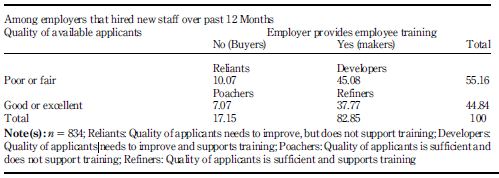
 This research delves into how employers perceive job applicant quality and their decision-making process regarding hiring and training. Using survey data from 834 employers in Southwestern Ontario, Canada, the study reveals four distinct employer types: Reliants (10%), who find applicant quality low and do not offer training; Developers (45%), who also find applicant quality low but invest in employee training; Poachers (7%), who perceive high applicant quality and do not provide training; and Refiners (38%), who see high applicant quality and offer training. The findings emphasize that employers should align their training decisions with their assessment of job applicant quality. The study also highlights a potential gap where educational institutions might not be adequately preparing individuals with the skills and experiences employers need. The broader implication is clear: when job openings remain unfilled due to mismatched hiring practices, everyone—from applicants to employers to society at large—loses out.
This research delves into how employers perceive job applicant quality and their decision-making process regarding hiring and training. Using survey data from 834 employers in Southwestern Ontario, Canada, the study reveals four distinct employer types: Reliants (10%), who find applicant quality low and do not offer training; Developers (45%), who also find applicant quality low but invest in employee training; Poachers (7%), who perceive high applicant quality and do not provide training; and Refiners (38%), who see high applicant quality and offer training. The findings emphasize that employers should align their training decisions with their assessment of job applicant quality. The study also highlights a potential gap where educational institutions might not be adequately preparing individuals with the skills and experiences employers need. The broader implication is clear: when job openings remain unfilled due to mismatched hiring practices, everyone—from applicants to employers to society at large—loses out.
Conference Presentations
Mann, S. L., Cooke, Gordon, and Chowhan, J. (2016). Research Collaboration on Employment Issues. Presentation at Ontario Ministry of Agriculture, Food and Rural Affairs (OMAFRA) - Rural Graduate Student Research Symposium Day, at the University of Guelph
Chowhan, J., and Mann, S. L. (2017). Employment Issues and Challenges from the Employers' Perspective: An analysis of the EmployerOne Survey. Paper presented at the Canadian Industrial Relations Association, 54th Annual Conference, Toronto, Ontario, May 27 - June 2.
Cooke, Gordon, Chowhan, J., and Mann, S. L. (2018). Employer Hiring Strategies: Buying or Developing Talent? Paper presented at the Canadian Industrial Relations Association, 55th Annual Conference, Montreal, Quebec, May 2-4.
MacDonald, K, Chowhan, J., Cooke, G.B., and Mann, S., (2020). A shortage of talent, or a shortage of commitment to workers? Types of staffing strategies among small Canadian employers. Presentation at the ILERA Conference 2020: 10TH International Labour and Employment Relations Association (ILERA) Regional Congress for the Americas. Session B: 2.2 Perspectives on Employee Development, Toronto, Canada, June 24-27.  See video at time 35:18.
See video at time 35:18.
Cooke, Gordon B., Chowhan, J., MacDonald, K., and Mann, S. (2022). Needed! Governments as the new training partner for untethered or ignored individuals (in Canada). Presented at the Adapt International Conference: Towards the social construction of new labour markets. Bergamo, Italy, November 22, 2022.
Kalynychenko, I., Chowhan, J., Cooke, G., and Mann, S. (2023). Talent Management: Effect of Employer Branding on Recruitment and Retention of Employees. Paper presented at the Canadian Industrial Relations Association, 60th Annual Conference, hosted by York University, Toronto, May 27-29.
